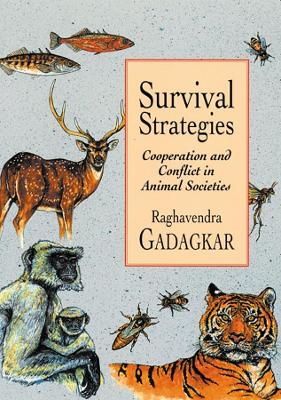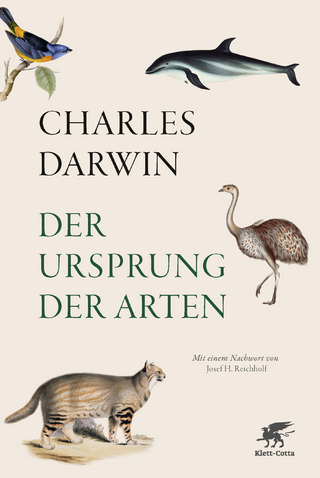
Survival Strategies
Cooperation and Conflict in Animal Societies
Seiten
2001
Harvard University Press (Verlag)
978-0-674-00557-0 (ISBN)
Harvard University Press (Verlag)
978-0-674-00557-0 (ISBN)
Only in recent years have biologists and ethologists begun to apply careful evolutionary thinking to the study of animal societies--and with spectacular results. This book presents the choicest of these findings, illustrated with both photographs and explanatory diagrams.
Did you know that Tasmanian hens have two husbands? That cellular slime molds commit suicide? That vampire bats will share food with hungry fellow bats and that hanuman langurs commit infanticide? Why creatures great and small behave in such fascinating and seemingly perplexing ways is explained in this delightful account of the evolutionary foundations of animal social behavior.
Only in recent years have biologists and ethologists begun to apply careful evolutionary thinking to the study of animal societies--and with spectacular results. This book presents the choicest of these findings, with a remarkable wealth of insights into the myriad strategies that animals have developed to perpetuate their kind. In an irresistible style, Raghavendra Gadagkar explores the strategies of cooperation and conflict adopted by animals--from the lordly lion to the primitive wasp worker--as they choose mates, raise their young, communicate with others, and establish the division of labor necessary to feed and protect the group and safeguard their territory.
Whether focusing on the birds or the bees, this book offers both superb descriptions and lucid explanations of many different behaviors encountered in the animal world: why a ground squirrel will sound an alarm--even risk its own safety--to warn fellow squirrels of impending danger; why weaver ant larvae donate silk for nest building; why house mice raise their offspring in a communal nursery; and how animals can recognize the relatives they want to favor--or avoid.
Illustrated with both photographs and explanatory diagrams, this expert and inviting tour of the social world of animals will inform and charm anyone curious about the motivations behind the amazing range of activity in the animal kingdom.
Did you know that Tasmanian hens have two husbands? That cellular slime molds commit suicide? That vampire bats will share food with hungry fellow bats and that hanuman langurs commit infanticide? Why creatures great and small behave in such fascinating and seemingly perplexing ways is explained in this delightful account of the evolutionary foundations of animal social behavior.
Only in recent years have biologists and ethologists begun to apply careful evolutionary thinking to the study of animal societies--and with spectacular results. This book presents the choicest of these findings, with a remarkable wealth of insights into the myriad strategies that animals have developed to perpetuate their kind. In an irresistible style, Raghavendra Gadagkar explores the strategies of cooperation and conflict adopted by animals--from the lordly lion to the primitive wasp worker--as they choose mates, raise their young, communicate with others, and establish the division of labor necessary to feed and protect the group and safeguard their territory.
Whether focusing on the birds or the bees, this book offers both superb descriptions and lucid explanations of many different behaviors encountered in the animal world: why a ground squirrel will sound an alarm--even risk its own safety--to warn fellow squirrels of impending danger; why weaver ant larvae donate silk for nest building; why house mice raise their offspring in a communal nursery; and how animals can recognize the relatives they want to favor--or avoid.
Illustrated with both photographs and explanatory diagrams, this expert and inviting tour of the social world of animals will inform and charm anyone curious about the motivations behind the amazing range of activity in the animal kingdom.
Raghavendra Gadagkar is Professor and Chairman of the Centre for Ecological Sciences, Indian Institute of Science, and Honorary Professor at the Jawaharlal Nehru Centre for Advanced Scientific Research in Bangalore, India.
Preface What Are Social Animals? Evolution, the Eternal Tinkerer It's in the Genes What Do Social Animals Do to Each Other? The Paradox of Altruism Do Animals Favor Their Relatives? A Primitive Wasp Society Games Animals Play The Fine Balance between Cooperation and Conflict Some Caveats and Conclusions Suggested Readings References Index
| Erscheint lt. Verlag | 14.6.2001 |
|---|---|
| Zusatzinfo | 20 halftones, 18 line illustrations, 3 tables |
| Verlagsort | Cambridge, Mass |
| Sprache | englisch |
| Maße | 143 x 202 mm |
| Gewicht | 263 g |
| Themenwelt | Naturwissenschaften ► Biologie ► Evolution |
| Naturwissenschaften ► Biologie ► Zoologie | |
| ISBN-10 | 0-674-00557-0 / 0674005570 |
| ISBN-13 | 978-0-674-00557-0 / 9780674005570 |
| Zustand | Neuware |
| Haben Sie eine Frage zum Produkt? |
Mehr entdecken
aus dem Bereich
aus dem Bereich
Komplette Neuübersetzung. Mit einem Nachwort von Josef H. Reichholf.
Buch | Hardcover (2018)
Klett-Cotta (Verlag)
48,00 €
Wie die Vernichtung der Arten unser Überleben bedroht - Der …
Buch | Softcover (2023)
Penguin (Verlag)
15,00 €


